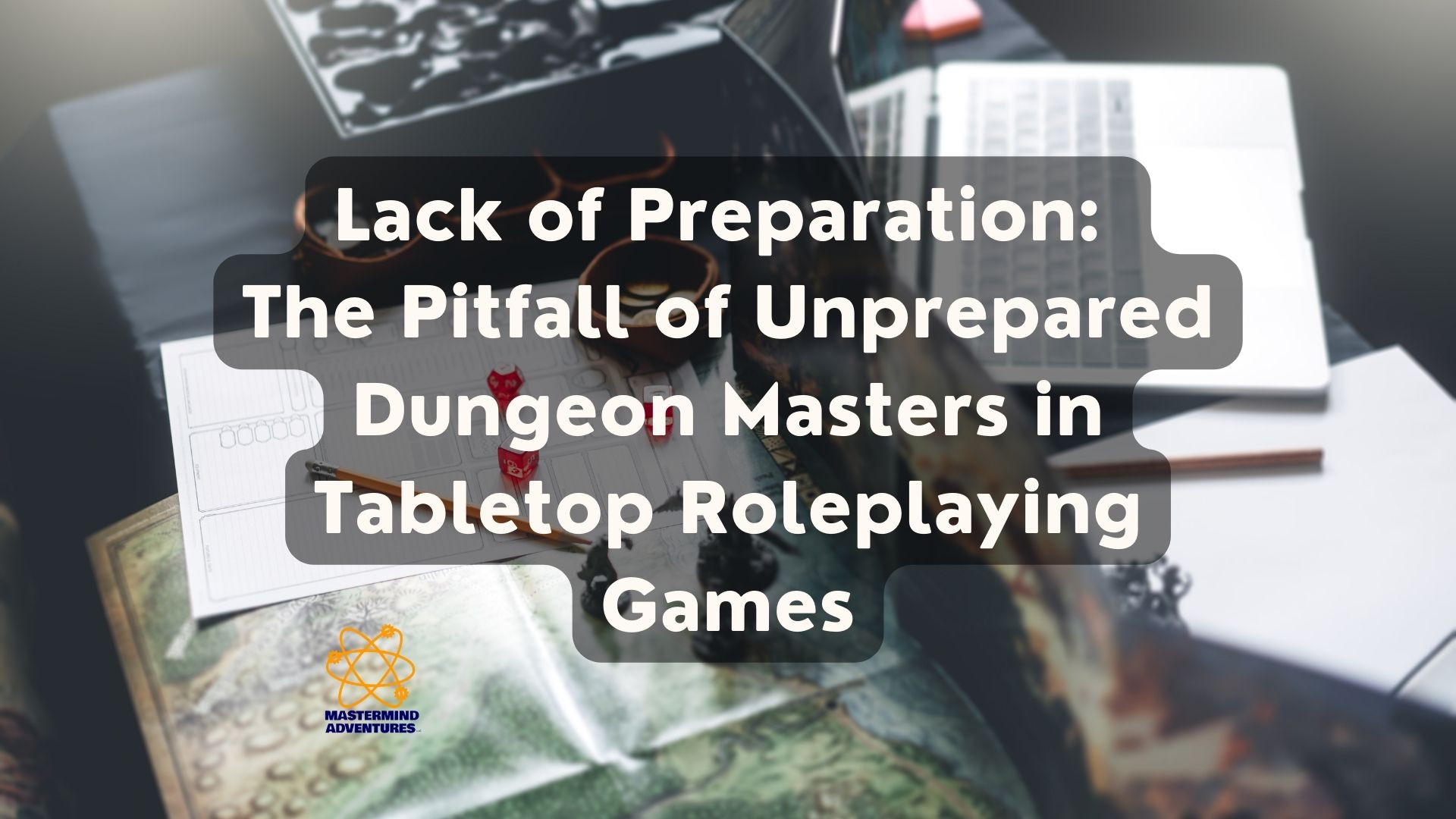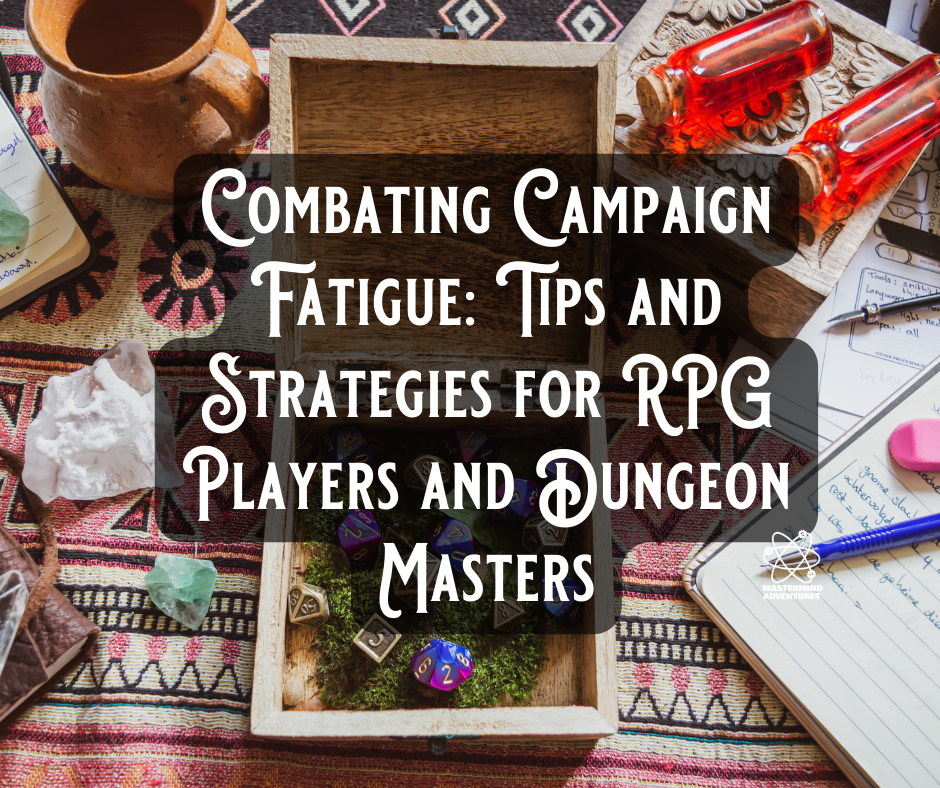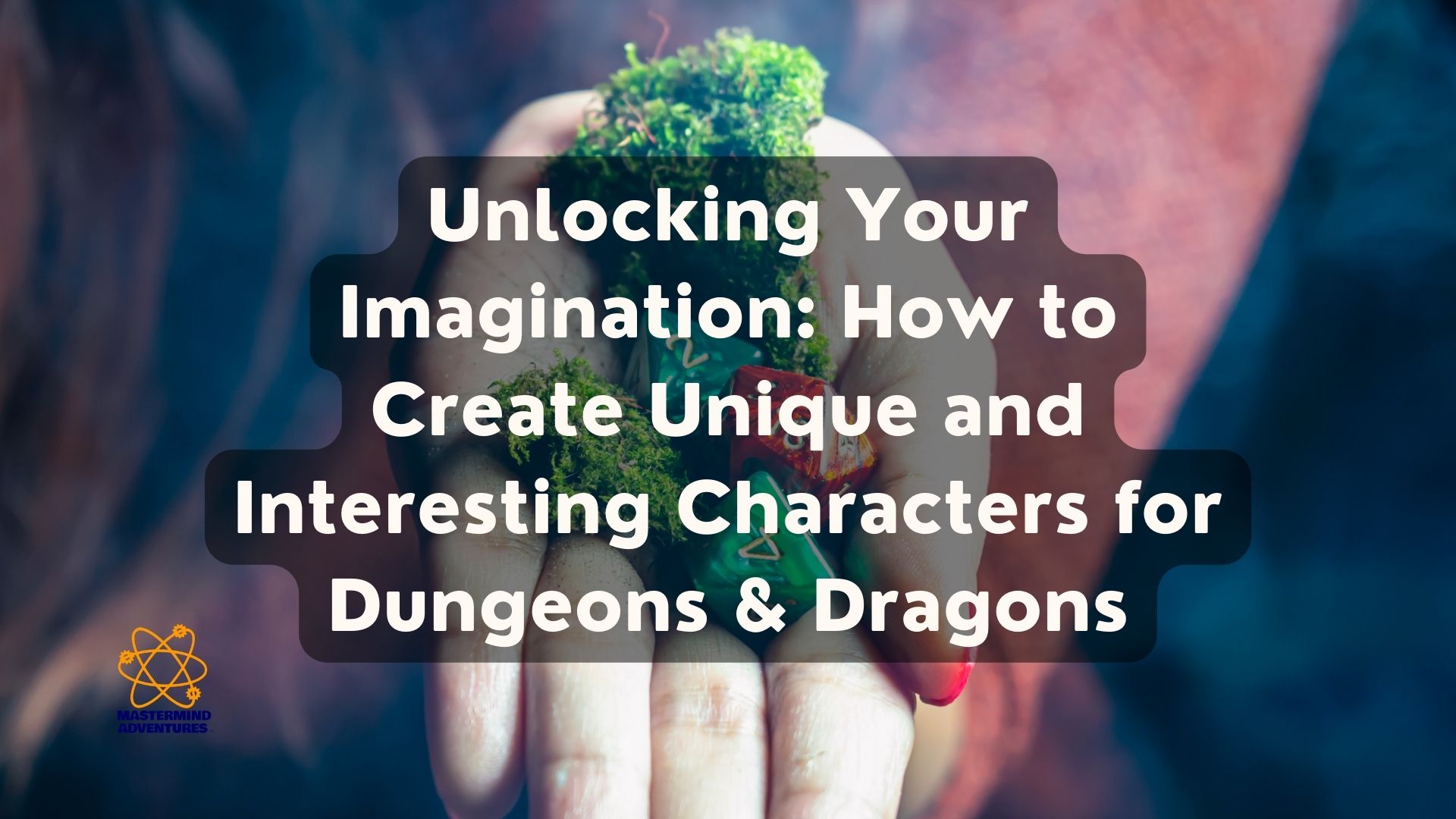Tabletop roleplaying games (TTRPGs) are a beloved form of entertainment that have captivated players for decades. At the heart of every TTRPG is the dungeon master (DM), the storyteller and game facilitator who creates the world, controls the NPCs (non-player characters), and guides the players through their adventures.
A skilled DM can craft memorable and immersive experiences that leave players eagerly anticipating the next game session. It’s one of the many benefits of hiring a vetted professional, like the Mastermind Adventures folks.
However, one of the top complaints from TTRPG players is that their DM is inadequately prepared for the game session, resulting in a lack of engaging storylines, poorly designed encounters, or inconsistency in world-building. In this article, we will explore the pitfalls of unprepared DMs and how it can impact the overall enjoyment of a TTRPG campaign.
Where do the problems come in?
Being a Dungeon Master is no small feat. A well-prepared DM is the backbone of a successful TTRPG campaign. They are responsible for creating the game world, developing the storylines, designing encounters, and improvising on the spot to keep the game flowing smoothly. However, when a DM is unprepared, it can have a detrimental effect on the game and leave players feeling disconnected and disengaged.
Lack of engaging storylines
One common complaint from players is that an unprepared DM may struggle to create engaging storylines. A compelling story is the foundation of any TTRPG campaign, and it should have a sense of purpose, direction, and meaning. It should provide players with interesting choices, opportunities for character development, and a sense of accomplishment. However, an unprepared DM may struggle to develop a coherent and engaging story, resulting in a disjointed and uninteresting campaign. Players may find themselves going through the motions without a clear understanding of their objectives or the consequences of their actions, which can lead to a lack of investment in the game.
Poorly designed encounters
Another issue that can arise from an unprepared DM is poorly designed encounters. Encounters, such as combat or social interactions, are pivotal moments in a TTRPG campaign. They provide opportunities for players to showcase their characters’ abilities, make decisions, and overcome challenges. However, when encounters are poorly designed, they can become monotonous, unbalanced, or uninteresting. An unprepared DM may not have taken the time to carefully plan out encounters, resulting in encounters that lack creativity, challenge, or variety. Players may find themselves slogging through repetitive encounters that offer little excitement or satisfaction, which can quickly diminish their enthusiasm for the game.
Inconsistent World-building
Inconsistency in world-building is another issue that can arise from an unprepared DM. A well-crafted game world is rich with lore, history, and details that create a sense of immersion and believability. However, an unprepared DM may struggle to maintain consistency in their world-building, leading to contradictions, plot holes, or inconsistencies. Players may find themselves confused or frustrated when the rules of the game world change abruptly or when the DM struggles to answer basic questions about the setting. This can break the immersion and sense of immersion in the game, making it harder for players to fully engage with the story and setting.
How to avoid these pitfalls?
So, how can DMs avoid the pitfall of unpreparedness?
Take time to prepare for the session
First and foremost, it’s essential for DMs to take the time to adequately prepare for each game session. This includes creating a well-structured story with a clear direction and purpose, designing encounters that are balanced, interesting, and varied, and developing a consistent game world with attention to detail. DMs should also be open to feedback from their players and be willing to make adjustments based on their input. Additionally, DMs can utilize various resources available, such as published adventures, online tools, and pre-generated content, to help with their preparation and ensure a more engaging and enjoyable game session.
Communication is key
On top of that, communication is key. DMs should have open and honest discussions with their players about their expectations for the game, what kind of storylines or encounters they enjoy, and any specific requests or feedback they may have. This can help the DM better tailor their preparation to meet the needs and interests of their players, resulting in a more engaging and enjoyable game experience.
Practice improvisation skills
DMs should be willing to improvise and adapt during the game session. Even with thorough preparation, unexpected situations can arise, and DMs need to be able to think on their feet and make decisions in the moment. This requires being familiar with the rules of the game system being played, having a good understanding of the world they have created, and being able to come up with creative solutions or story twists on the spot. A well-prepared DM will be better equipped to handle these situations, providing a more dynamic and engaging game for the players.
Resources
As a Dungeon Master (DM), preparation is crucial to creating a compelling and immersive tabletop role-playing game (TTRPG) experience for your players. Here are some resources that can help you be better prepared for your game sessions:
- Official Game Books: Most TTRPG systems, such as Dungeons & Dragons, have official rulebooks that provide comprehensive guidelines, rules, and resources for running the game. These books typically include information on game mechanics, character creation, world-building, and various campaign settings. Familiarize yourself with the core rulebooks and any supplementary materials that are relevant to your campaign setting.
- Adventure Modules: Many TTRPG systems offer pre-written adventure modules that provide pre-designed storylines, encounters, and NPCs for DMs to use in their campaigns. These modules can be a great resource for DMs who are short on time or are new to DMing, as they provide a structured framework for running a game session. You can either use them as written or customize them to fit your campaign world and player preferences. You can also find modules written by game enthusiasts on sites like DrivethruRPG.
- Online Resources: The internet is a treasure trove of resources for DMs. There are numerous websites, forums, and blogs that offer advice, tips, and resources for running TTRPG campaigns. From world-building guides to encounter generators, character generators to map-making tools, there are plenty of online resources that can help you streamline your preparation process and enhance your game sessions.
- Player Feedback: Your players can be a valuable source of feedback to improve your game preparation. After each session, ask your players for feedback on what worked well and what could be improved. Take note of their suggestions and use them to make adjustments to your preparation for future sessions. This will help you align your game with your players’ expectations and create a more engaging experience for them.
- Campaign Notes and Organization Tools: Keeping organized campaign notes can greatly aid in your preparation. Use tools such as notebooks, online document editors, or campaign management software to keep track of important details like NPCs, locations, story hooks, and player character information. Having easy access to your campaign notes will save you time and effort during game preparation and help you maintain consistency in your world-building.
- Creativity and Imagination: As a DM, your creativity and imagination are your most powerful tools. Don’t be afraid to think outside the box, come up with unique storylines, and create memorable encounters. Use your creativity to design interesting and dynamic worlds, NPCs, and story arcs that will captivate your players’ imaginations and keep them engaged in the game.
- Time Management: Adequate time management is essential for effective game preparation. Set aside dedicated time for game preparation, whether it’s brainstorming ideas, creating NPCs, designing encounters, or building your world. Avoid last-minute cramming and give yourself enough time to thoroughly prepare for each session, so you can provide a well-crafted and engaging experience for your players.
- Experience: Experience is an invaluable resource for DMs. The more you DM, the better you will become at preparing for your game sessions. You will learn from your mistakes, develop your style, and become more proficient in managing your campaign. Don’t be afraid to learn from other experienced DMs or seek mentorship from more seasoned players to enhance your preparation skills.
The lack of preparation by a DM can significantly impact the enjoyment of a TTRPG campaign. Players may experience poorly designed storylines, encounters, and inconsistencies in the game world, leading to a disengaging experience. However, DMs can avoid this pitfall by taking the time to adequately prepare for each game session, communicating with their players, being open to feedback, and being willing to adapt during the game. By doing so, DMs can create immersive and engaging experiences for their players, leading to a more satisfying and enjoyable TTRPG campaign.
Utilize a combination of official game books, adventure modules, online resources, player feedback, campaign notes and organization tools, creativity and imagination, time management, and experience to enhance your game preparation process. With proper preparation, you can create memorable and enjoyable game sessions that will keep your players eagerly anticipating the next session.
Remember, the heart of any TTRPG is the storytelling and the collaborative effort between the DM and the players. With proper preparation and dedication to creating an engaging game world, a DM can create a memorable and immersive experience that will leave players eagerly anticipating the next session.








Leave A Comment